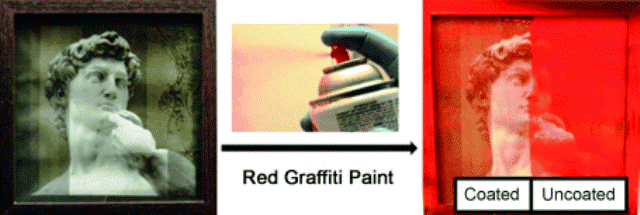May 4 2015
Requirements for anti-smudge coatings are tough: They should be invisible, thin, repel any possible contaminant while not affecting the desired properties of the substrate, and they should be highly durable. In the journal Angewandte Chemie, Canadian scientists now present a new coating approach based on graft-copolymer micelles embedded in a polyurethane (PU) polymer. A coating based on these micelles has constant surface properties, even after extensive wear.
 © Wiley-VCH
© Wiley-VCH
To attain oil- and water-repellent properties, fluorinated polymers have been incorporated into PU coatings. However, the added fluorinated species normally phase segregates from the PU coating components, yielding cloudy films. In addition, such a coating would be excessively rich in fluorinated species on the surface. When the surface fluorinated layer is worn off by rubbing, the anti-smudge properties deteriorate. To tackle these issues, block-copolymer specialists Guojun Liu and Muhammad Rabnawaz from Queen's University in Kingston (Ontario, Canada), have developed a novel approach taking advantage of the self-assembling properties of a graft copolymer made up of a backbone containing many hydroxyl groups (polyol) and side chains consisting of a fluorinated polymer oil.
"We imagined that these polyols would self-assemble in a hydrocarbon solvent into micelles with the fluorinated side chains as the core and the backbone as the corona", the authors said. They then generated a crosslinked polyurethane matrix by adding the parent polyol and a reactive diisocyanate to the micelle solution. The premise was that the fluorinated polyol micelles would be evenly distributed inside the cured PU bulk, and so, partial wearing of the coating would expose fluorinated domains within the coating matrix on the new surface.
Indeed, these designer coatings turned out to be transparent, non-wettable, anti-smudge, anti-graffiti, and also wear-resistant, Liu and Rabnawaz write. They are clear because the fluorinated polymer oil does not undergo macrophase separation from the PU components, they are ink-repellent because they have the fluorinated polymer oils incorporated, and they are not wettable because of the high degree of crosslinking. And, most importantly, they are highly durable because of their micelles serving as stable reservoirs for the fluorinated chains, so even worn surfaces will not differ much in their composition from new ones.
The scientists envisage applications for touchscreens and anti-graffiti coatings. "Our fluorinated PU formulations can be applied onto various substrates", they say. Indeed, one example of such applications is already presented in their publication in Angewandte Chemie: They coated one half of a smartphone’s surface and found no difference in usability of the touch screen between the two coating areas. And more importantly, its ink and paint resistance makes the new coating not only fingerprint-repellent for hand-held devices, but it may also serve as to protect wall surfaces from unwanted graffiti.
About the Author
Dr. Guojun Liu is Professor at the Department of Chemistry of Queen's University in Kingston, Ontario (Canada). His group is dedicated in design, preparation, study, and application of architectural materials of block and graft copolymers. Dr. Liu has received several awards, the most recent being the Macromolecular Science and Engineering Division Award from the Chemical Institute of Canada and the Distinguished Oversea Chinese Young Investigator Award from the Chinese Academy of Sciences.
Author: Guojun Liu, Queen's University, Kingston (Canada), http://faculty.chem.queensu.ca/people/faculty/Liu/index.html
Source: http://onlinelibrary.wiley.com/